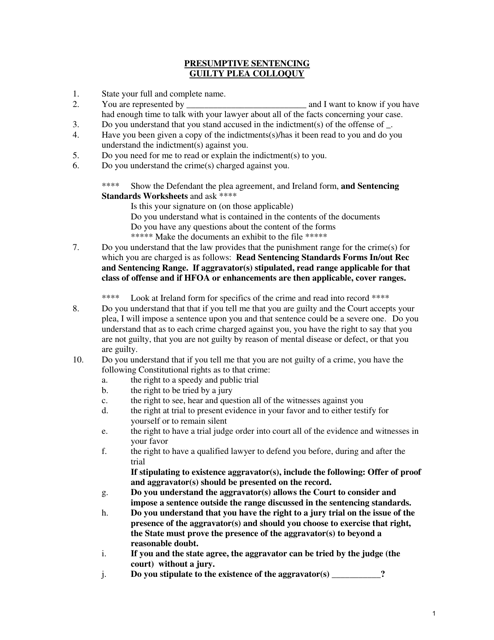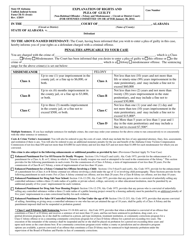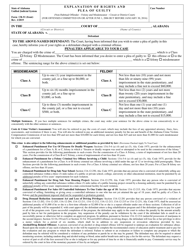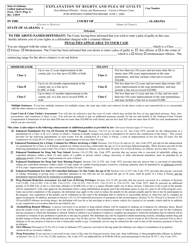Presumptive Sentencing Guilty Plea Colloquy - Alabama
Presumptive Sentencing Guilty Plea Colloquy is a legal document that was released by the Alabama Judicial System - a government authority operating within Alabama.
FAQ
Q: What is presumptive sentencing?
A: Presumptive sentencing is a system that establishes fixed ranges of punishment for certain criminal offenses based on the severity of the offense and the offender's criminal history.
Q: What is a guilty plea colloquy?
A: A guilty plea colloquy is a legal process where the judge ensures that a defendant who is pleading guilty does so voluntarily, understands the charges against them, and understands the consequences of their plea.
Q: What is the purpose of a guilty plea colloquy?
A: The purpose of a guilty plea colloquy is to protect the rights of the defendant and ensure that their guilty plea is informed and voluntary.
Q: What happens during a guilty plea colloquy?
A: During a guilty plea colloquy, the judge asks the defendant a series of questions to ensure that they understand the charges, the consequences of their plea, and that they are entering their plea voluntarily.
Q: Why is a guilty plea colloquy important?
A: A guilty plea colloquy is important to prevent defendants from unknowingly or involuntarily pleading guilty, and to ensure that their constitutional rights are upheld.
Q: What is the role of the judge in a guilty plea colloquy?
A: The role of the judge in a guilty plea colloquy is to ensure that the defendant's guilty plea is valid, voluntary, and informed.
Q: Do all states have presumptive sentencing and guilty plea colloquy?
A: Not all states have presumptive sentencing and guilty plea colloquy requirements. Each state may have its own laws and procedures regarding guilty pleas and sentencing.
Form Details:
- The latest edition currently provided by the Alabama Judicial System;
- Ready to use and print;
- Easy to customize;
- Compatible with most PDF-viewing applications;
- Fill out the form in our online filing application.
Download a fillable version of the form by clicking the link below or browse more documents and templates provided by the Alabama Judicial System.
















